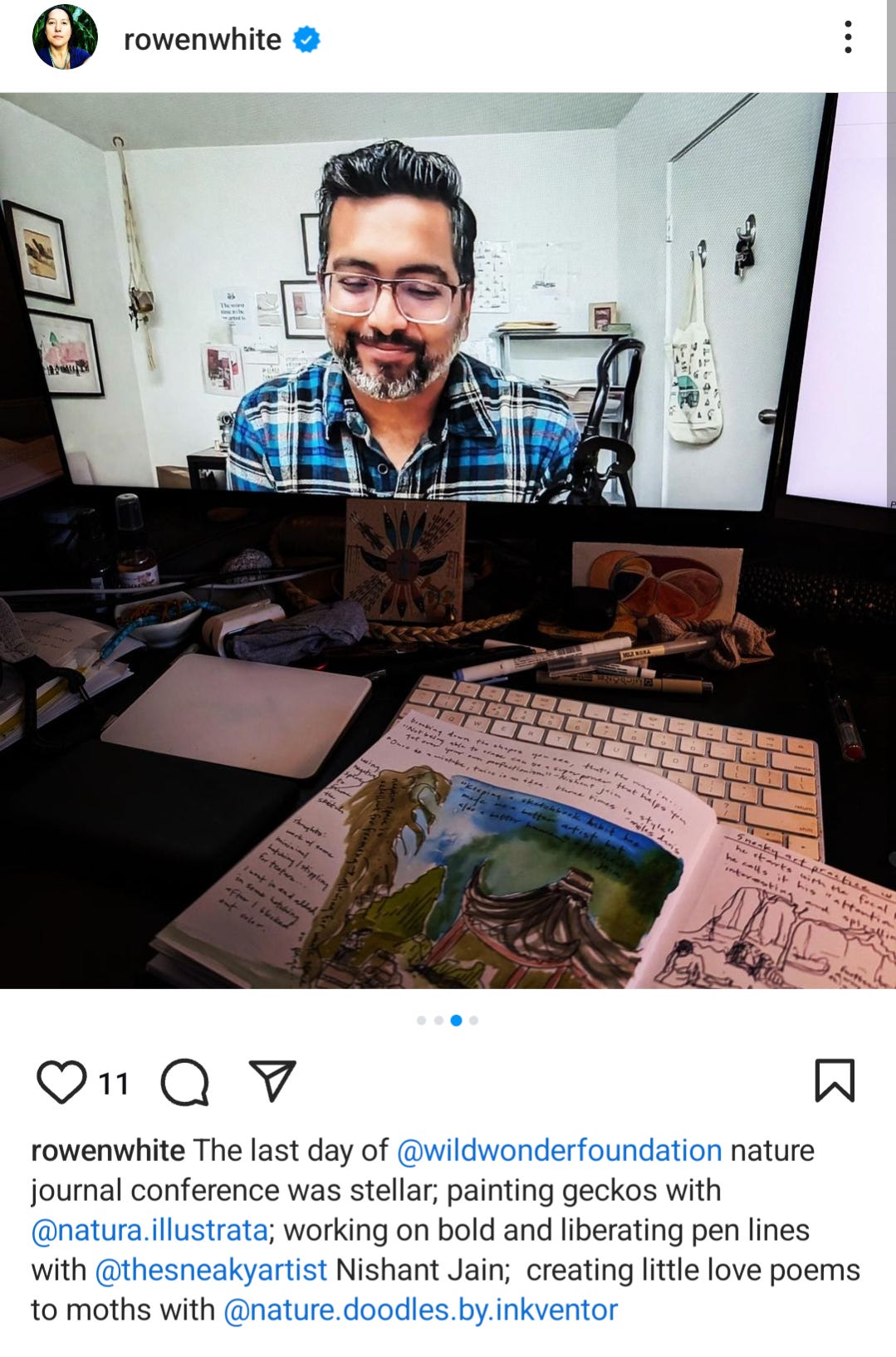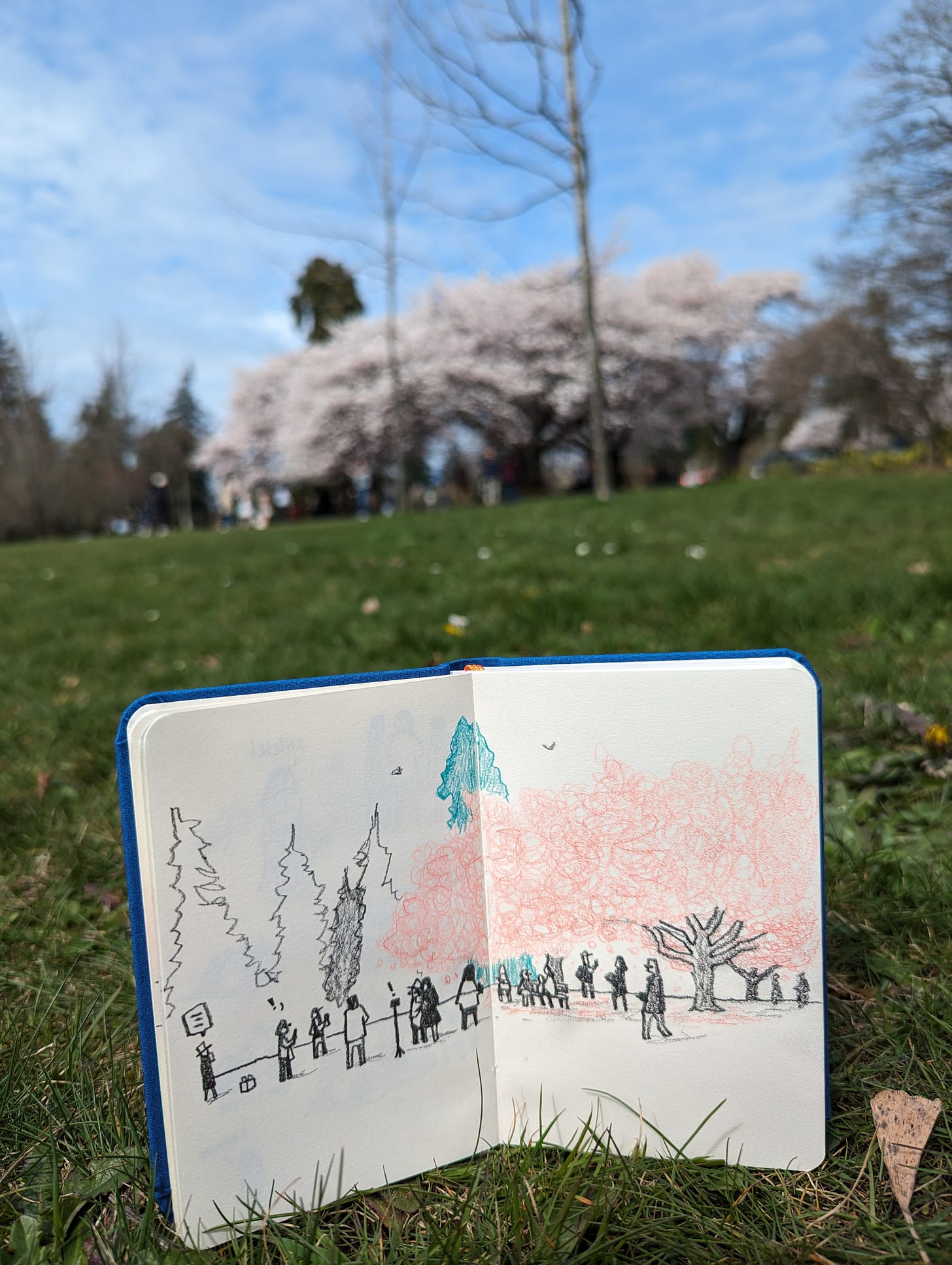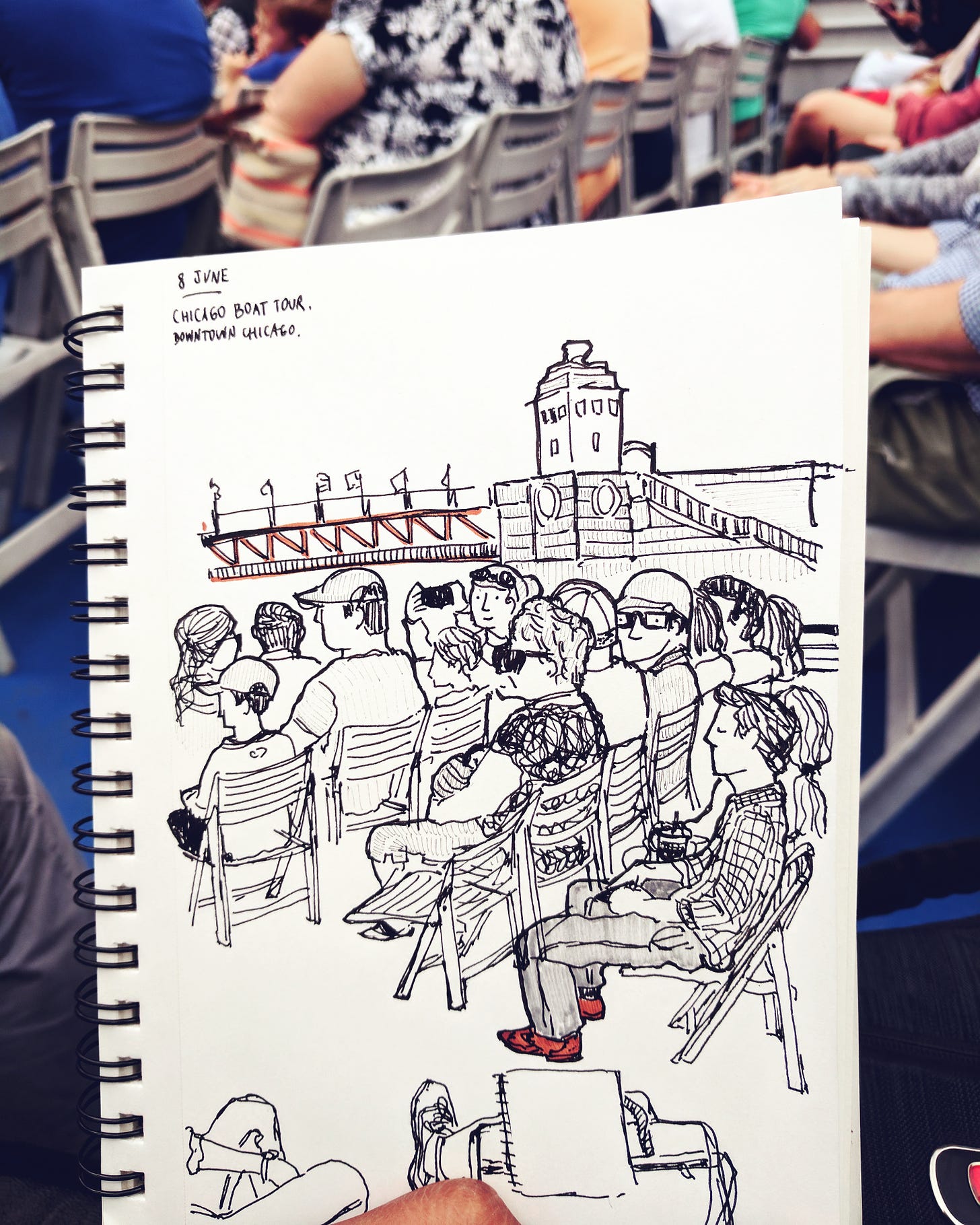249. Your Art should Reflect your Curiosity
Takeaways from my talk at the Wild Wonder Conference for Nature Journaling
Dear reader,
There are many new signups so allow me a minute to re-introduce this space.
Hello! My name is Nishant and I am a Sneaky Artist. This is a job title I made up for myself. As it turns out, you are allowed to do that sort of thing? I wrote about how that feels simultaneously weird and empowering. I also spoke about it last year at Pecha Kucha Nights Vancouver.
This newsletter is a space for positive, mindful, and sincere engagement - all the things that social media has taken away from us. I do not want to be in the business of manipulating your split-second attention. Your experience of the art you love should not be an infinite feed optimized to serve ads. We deserve a better equation. Writing to you gives me the space to think deeply about my work, and asks for only 5 minutes of your time every week. Whenever you have it, whenever you want to give it, I am glad to have a share of your time and attention.
This Sunday, I spoke at the Wild Wonder Conference about observing nature in urban landscapes, and how sketchbooks make you a better observer. Today’s post is the first in a short series diving into the big ideas from this session.
The SneakyArt Post is a newsletter about secretly drawn art of the world. Every week, I share the latest pages from my sketchbook and the best ideas from my journey as an artist and writer.

All 30 sessions of the Wild Wonder Conference are available for viewing with an All-Access Video Pass! These sessions are truly insightful, and suitable for all kinds of artists, writers, journalers, hikers - basically anyone who is observing and engaging with their natural environment. I super-recommend it.
We Need Permission to Pursue our Curiosities
At the Wild Wonder Conference, I saw people excited to learn about drawing moths, shells, and puffins, and birds in the sky. Attendees wanted to know the right way to use watercolors to paint skies, the best use of pencils for quick field sketching, and how they could combine words and images on their pages. Other journalers showed pages they had annotated with field observations and weather data, graphs of their moods and energy levels through the day, and poetry, there was poetry too. It was amazing to see the diversity of curiosity and passions that had come under the big umbrella of nature journaling.
Maybe all of us seek permission from others to do the things we really want to do. And by sharing our pages, our journeys, and our stories, we were giving each other the permission to pursue our curiosities.

A Sketchbook Can Help
It is not easy to pursue your curiosity, or even to always identify it. Deep interests need to be nurtured, like plants. And like plants they also need to be fed. They need clean air and fertile soil, time and attention. It is difficult to find those things today because our attention spans are controlled by billionaire corporations that drown us in shallow trivialities to generate ad revenue and sell cheaply produced goods.
A sketchbook is an invitation to spend time at a location and observe deeply.
My sketchbook habit began when I was an immigrant in North America. I felt out of place in Chicago because I was a stranger in this new world. I needed to understand my environment and the people with whom I was sharing it. I needed to make myself at home. At the same time I also needed to understand myself, because I had just quit my job to become a novelist, and the writing was not going well. So my sketchbook habit also began as a way to procrastinate from writing.
By accident, I like to say, I became an artist. I did not recognize it at the time, but all the conditions had been met for deep interests to take root. The final catalyst was my curiosity for the people of Chicago, and the beauty of this great city of the world.
Since those days of early 2017, the art has evolved and a style has emerged. But it is still the same curiosity. I am curious about people. I am curious about how strangers live around one another. I am curious about how cities enable our independent journeys, and how we support one another even when we do not know our neighbours. Simply the act of living in a city, it seems, involves unspoken cooperation with hundreds of thousands of strangers.
With my sketchbook, I like to find evidence for this. It helps me be a better human, and it helps me make home.
Reader, what are you curious about in your urban environment? What do your eyes notice when you go out for a walk?
This month, I shared my sketchbooks at my studio in Vancouver. If you live in the city, would you like to attend my next Open Studio Day in December?
Vancouver readers, say hello in the comments!
A Curiosity Compass
Your art, your words, your observations, your journaling, should reflect your curiosity. It is the most powerful creative tool you have.
What makes you curious is an aspect of your personality, your taste, your likes, dislikes, life experiences, traumas, setbacks, successes. It is a thing of you, a summation of your complex self even when you cannot point it in a clear direction.
But this is also where the sketchbook comes in. When you use a sketchbook to spend time and observe deeply, when you draw from quick observations and note the little things, the pages teach you about yourself. You do not need to have the answers before you begin. A sketchbook habit is a journey, and on this journey you find yourself. The means are the ends.
All it needs from you is a pen or a pencil, or a brush with some colours, and enthusiasm. It has nothing to do with skill level. What you gain from a sketchbook has nothing to do with how good your art looks. All journey, no destination.
Reader, do you have a sketchbook or journal? What kind of things do you put in it?

The Assault of Other People’s Opinions
We suffer from a curious affliction - a pandemic that has gone unnoticed. It started happening a couple of decades ago, and has nearly consumed the entire planet. There is no known cure, but I think we know the cause.
A virus lives inside us. It tells us nothing is worth doing that cannot be done for likes. It admonishes us when we try to learn a new thing. It reprimands us for not considering how this person or that may judge us. It demands that we consider the ideas and opinions of countless, anonymous strangers when we pose for a photo, or point our lens at the world, or pick up a pencil, or walk our own paths.
Do as others do. Do not do what others do not do. The likes won’t come if you don’t please everyone. Your job is to get the likes. To please everyone. More likes. Again. And again. Take the count higher. Make it faster. Faster than yesterday. Faster again tomorrow.
Reader, have you heard the virus of social media inside your head?
We are under assault from other people’s opinions even when they have no such intentions towards us. It is simply the design of the systems that control our attention spans. No one is looking, but everyone everywhere might as well be. The like button shapes our behaviour, affects our taste, and controls what we allow ourselves to say, and hear, and read, and think, and do. This is the panopticon closing around your mind and you need to escape it.
Keep a secret sketchbook
Tell no one about it. Make it a little thing that sits inside a jacket pocket with a pen or pencil ready to go. A private space for your thoughts, for a conversation between you and the page, and no one else. Sometimes a conversation in words and scribbles, but sometimes a conversation in line and color utterly outside of language.
I do not know how your secret sketchbook would turn out. But I know it will be your own journey. And that is a precious thing. From over here, across the screen, I am cheering you on. Go!
Thank you for reading.










I love this and picked up a sketchbook of my own just last week! Thank you for the impetus to start sketching again. Your joy and curiosity are contagious.
I don't have a sketchbook, but i have two journalling notebooks (one for writing my usual thoughts and feelings about myself and others, and one for my secrets). I only write in either of my notebooks when i sense there's too much on my mind's plate. My secrets, btw, are my dark, unusual thoughts about people and events.